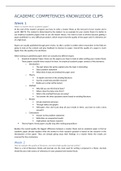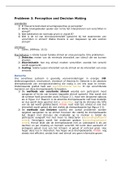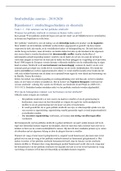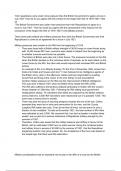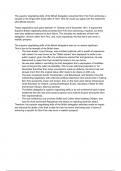ACADEMIC COMPETENCES KNOWLEDGE CLIPS
Week 1
What is a master thesis/ academic paper?
At the end of the master’s program you have to write a master thesis as the last part of your master and is
worth 18ECTS. The content is determined by the student. As an example for your master thesis it is better to
use empirical academic papers than to use old master theses. You want to look at articles because getting a
paper published is a very difficult procedure, which ensures that the quality of the paper and it’s elements are
of a high level.
Papers are usually published through peer review. So after a article is written other researchers in the field are
going to look at the content and give feedback to improve te paper. Overall the quality of a paper is much
higher than the quality of an old thesis.
When looking at published papers there are actually two different types:
Empirical Academic Paper: these are the papers you have to look at when writing your master thesis.
These papers actually have research in them. An empirical academic paper consists of five elements:
o Introduction
The part where the writer explains why the topic is interesting
Exact problem statement
What kind of data and method the paper used
o Theory
In-depth overview of the existing literature
Goal to create best possible research
Builds up to what will be tested
o Method
Why did you use this kind of data?
Where does the data come from?
What is the method that you are using?
You answer the three questions above based on existing literature
o Results
Actual empirical outcomes
Through tables and graphs
Helicopter view: don’t just drop all your results in there, you have to craft a story
around it
o Conclusions
Answer to the problem statement
Reflection on unexpected results
Implications and future research
Theory Papers: these papers usually stop after making propositions
Besides the overall quality the biggest difference between a master thesis and an academic paper is that an
academic paper already explains what the answer to their research question is based on the research in the
introduction of the paper. They are already giving away their findings. In a master thesis the results are
reserved for the conclusions.
Week 2
How to evaluate the quality of literature, and select high-quality journal articles?
There is a lot of literature. Books and journals are the most used for writing a proposal in a thesis. Journals
should be your main source of references in your proposal and master thesis.
, There are four reasons why reading good quality papers is important:
Good quality papers tend to have more significant theoretical contributions
They entail more creative and new ideas
They adopt robust methodologies in data collection and analysis
More trustworthy and reliable findings in general
GIGO (garbage in, garbage out): The quality of information coming out cannot be better than the quality of
information that went in.
There are three steps to ensure that the papers that you read are of good quality:
Step 1: Peer-reviewed papers
The best quality control scientific journals have to offer
There is no better alternative than letting te most knowledgeable experts on this planet evaluate a
research paper
More prestigious journals tend to have more comprehensive peer-review process
o For example, the acceptance rate for Journal of Operations Management is about 2%
Step 2: The quality of a journal
Journal impact factor – the frequency with which the average paper in a journal has been cited over a
certain period of time.
o Journal Citation Reports (JCR)
o SCImago Journal Rank (SJR)
Journal quality list
o The Financial Times 50 List (FT50)
o The University of Texas at Dallas 24 List (UTD24)
o Association of Business Schools’ Academic Journal Guide (ABS)
o Erasmus Research Institute of Management Journals Listing (ERIM/EJL)
Step 3: Citations of a paper and from the author
This can be done by entering the papers name in google scholar. You can see how many times the paper has
been cited. You can also track one of the papers authors on google scholar. You can assess how productive a
researcher is by the h-index. You give an h-index to someone based on the number of papers (h), that have
been cited (h) times.
Rule of the thumb
Always go for peer-reviewed papers
Journals with high impact factors
Journals with higher ranking
Authors with higher h-index
Referencing and plagiarism
You have to build on the work of others, to increase the quality of your own work. It also increases the
credibility of your work, because it shows that it’s not just your idea but there are other people who would
agree. Lastly it also makes your work more relevant, because there are others also interested in the topic. But
in other to build on work of others you have to cite and quote.
What can be cited?
Findings from articles
Discussions
Conclusions
Only in rare cases theory is cited
Week 1
What is a master thesis/ academic paper?
At the end of the master’s program you have to write a master thesis as the last part of your master and is
worth 18ECTS. The content is determined by the student. As an example for your master thesis it is better to
use empirical academic papers than to use old master theses. You want to look at articles because getting a
paper published is a very difficult procedure, which ensures that the quality of the paper and it’s elements are
of a high level.
Papers are usually published through peer review. So after a article is written other researchers in the field are
going to look at the content and give feedback to improve te paper. Overall the quality of a paper is much
higher than the quality of an old thesis.
When looking at published papers there are actually two different types:
Empirical Academic Paper: these are the papers you have to look at when writing your master thesis.
These papers actually have research in them. An empirical academic paper consists of five elements:
o Introduction
The part where the writer explains why the topic is interesting
Exact problem statement
What kind of data and method the paper used
o Theory
In-depth overview of the existing literature
Goal to create best possible research
Builds up to what will be tested
o Method
Why did you use this kind of data?
Where does the data come from?
What is the method that you are using?
You answer the three questions above based on existing literature
o Results
Actual empirical outcomes
Through tables and graphs
Helicopter view: don’t just drop all your results in there, you have to craft a story
around it
o Conclusions
Answer to the problem statement
Reflection on unexpected results
Implications and future research
Theory Papers: these papers usually stop after making propositions
Besides the overall quality the biggest difference between a master thesis and an academic paper is that an
academic paper already explains what the answer to their research question is based on the research in the
introduction of the paper. They are already giving away their findings. In a master thesis the results are
reserved for the conclusions.
Week 2
How to evaluate the quality of literature, and select high-quality journal articles?
There is a lot of literature. Books and journals are the most used for writing a proposal in a thesis. Journals
should be your main source of references in your proposal and master thesis.
, There are four reasons why reading good quality papers is important:
Good quality papers tend to have more significant theoretical contributions
They entail more creative and new ideas
They adopt robust methodologies in data collection and analysis
More trustworthy and reliable findings in general
GIGO (garbage in, garbage out): The quality of information coming out cannot be better than the quality of
information that went in.
There are three steps to ensure that the papers that you read are of good quality:
Step 1: Peer-reviewed papers
The best quality control scientific journals have to offer
There is no better alternative than letting te most knowledgeable experts on this planet evaluate a
research paper
More prestigious journals tend to have more comprehensive peer-review process
o For example, the acceptance rate for Journal of Operations Management is about 2%
Step 2: The quality of a journal
Journal impact factor – the frequency with which the average paper in a journal has been cited over a
certain period of time.
o Journal Citation Reports (JCR)
o SCImago Journal Rank (SJR)
Journal quality list
o The Financial Times 50 List (FT50)
o The University of Texas at Dallas 24 List (UTD24)
o Association of Business Schools’ Academic Journal Guide (ABS)
o Erasmus Research Institute of Management Journals Listing (ERIM/EJL)
Step 3: Citations of a paper and from the author
This can be done by entering the papers name in google scholar. You can see how many times the paper has
been cited. You can also track one of the papers authors on google scholar. You can assess how productive a
researcher is by the h-index. You give an h-index to someone based on the number of papers (h), that have
been cited (h) times.
Rule of the thumb
Always go for peer-reviewed papers
Journals with high impact factors
Journals with higher ranking
Authors with higher h-index
Referencing and plagiarism
You have to build on the work of others, to increase the quality of your own work. It also increases the
credibility of your work, because it shows that it’s not just your idea but there are other people who would
agree. Lastly it also makes your work more relevant, because there are others also interested in the topic. But
in other to build on work of others you have to cite and quote.
What can be cited?
Findings from articles
Discussions
Conclusions
Only in rare cases theory is cited

